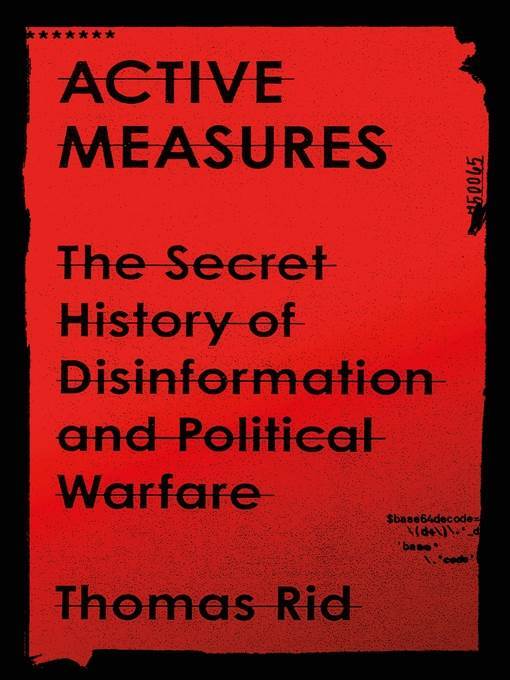
Active Measures
The Secret History of Disinformation and Political Warfare
کتاب های مرتبط
- اطلاعات
- نقد و بررسی
- دیدگاه کاربران
نقد و بررسی

February 1, 2020
A Johns Hopkins professor of strategic studies delves into the murky history--and current pervasiveness--of disinformation. Rid, whose previous book, Rise of the Machines, focused on cybernetics, opens in 2016, as the Russians were employing disinformation to influence the American presidential election, and then moves back in time to offer a well-packed history beginning in the 1920s. "This modern era of disinformation," he writes, "began in the early 1920s, and the art and science of what the CIA once called 'political warfare' grew and changed in four big waves, each a generation apart." The first wave occurred as the widespread access to radio offered an effective new technology for enemy governments hoping to influence listeners to revolt against their own governments. The second wave occurred during the Cold War, with the CIA as the main culprit. The third wave encompassed the 1970s, with a massively funded Soviet bureaucracy as the main culprit. The fourth wave has extended into the present, with labyrinthine government spy bureaucracies losing ground to renegade computer hackers operating 24/7. While the digital era in general and the internet in particular have altered the tactics of government spy agencies, the author demonstrates in massive detail how such destabilization has flowed in multiple directions for the past century. The U.S. government, mostly through the CIA, has mounted countless campaigns to harm so-called communist nations, especially during the post-World War II era. On the communist side, Rid emphasizes the relentless disinformation campaigns emanating from the Soviet Union/Russia as well as from East Germany before its reunification with West Germany. The chronological narrative will demand significant effort from lay readers--not due to lack of clarity by the author, whose style is engaging, but because every extended case study requires separating partial truths told by the spy agency from the vast untruths that are necessarily part of the mix. For readers interested in current politics, Rid offers expert opinion that Russia is actively working to erode the foundation of U.S. democracy. A dense but highly relevant and useful study, especially as we approach the 2020 election.
COPYRIGHT(2020) Kirkus Reviews, ALL RIGHTS RESERVED.

Starred review from March 9, 2020
The shadow war of lying—and truth-telling—between Russia and the U.S. is explored in this revealing study of covert propaganda. Rid (Rise of the Machines), a strategic studies professor at Johns Hopkins University, revisits attempts by Soviet/Russian and American intelligence agencies (plus a few by the East German Stasi and others) to influence foreign governments and public opinion by spreading false claims or leaking true information. He examines dozens of operations, including the Bolsheviks’ establishment of a fake Tsarist group to confuse their real Tsarist foes in the 1920s, CIA forgeries of East German magazines in the 1950s, Soviet-sponsored conspiracy theories that AIDS started as an American bioweapon, and the Russian hacking and publishing of Democratic National Committee emails during the 2016 election. There are plenty of clever, clandestine capers in Rid’s well-researched, briskly paced narrative, as well as shrewd analysis of the subtleties of making disinformation both damaging and believable, and the difficulty of knowing whether it is effective. The excellent discussion of Russian pro-Trump social media propaganda concludes that “it is unlikely that trolls convinced many, if any, American voters,” and that its main impact was the media hysteria it generated. Rid skillfully illuminates and demystifies this ballyhooed but much-misunderstood subject.

March 13, 2020
With this latest work, Rid (strategic studies, Johns Hopkins Univ.; Rise of the Machines) offers a history of the political control of information, usually in the form of disinformation. He includes several historical examples from the "information war" between the former USSR and the United States, and then moves into more recent examples of using information as a weapon by figures such as Chelsea Manning and Edward Snowden. The work spans from the time period between the world wars to the present, including illuminating examples from the German effort for information control during World War II. Later, Rid asserts that the rise of the internet and information being leaked and published by groups such as Anonymous and Wikileaks shows a change in the landscape and the context of politics itself. Covering a lot of ground in this dense but thorough account, Rid further includes primary sources that brilliantly show how "information wars" have been waged throughout history. VERDICT A fascinating read for those who appreciate learning about history within a complex political context.--Jesse A. Lambertson, Univ. of Chicago Law Libs.
Copyright 2020 Library Journal, LLC Used with permission.

























دیدگاه کاربران